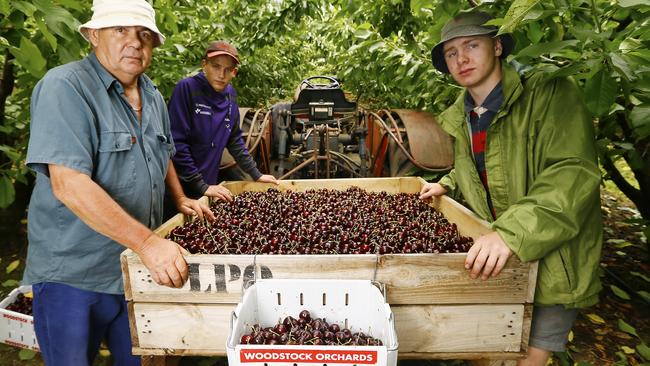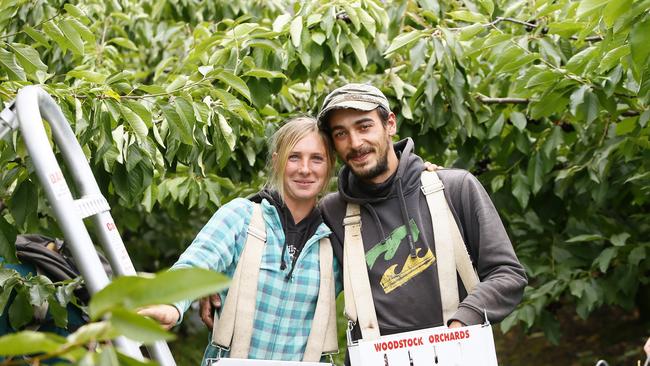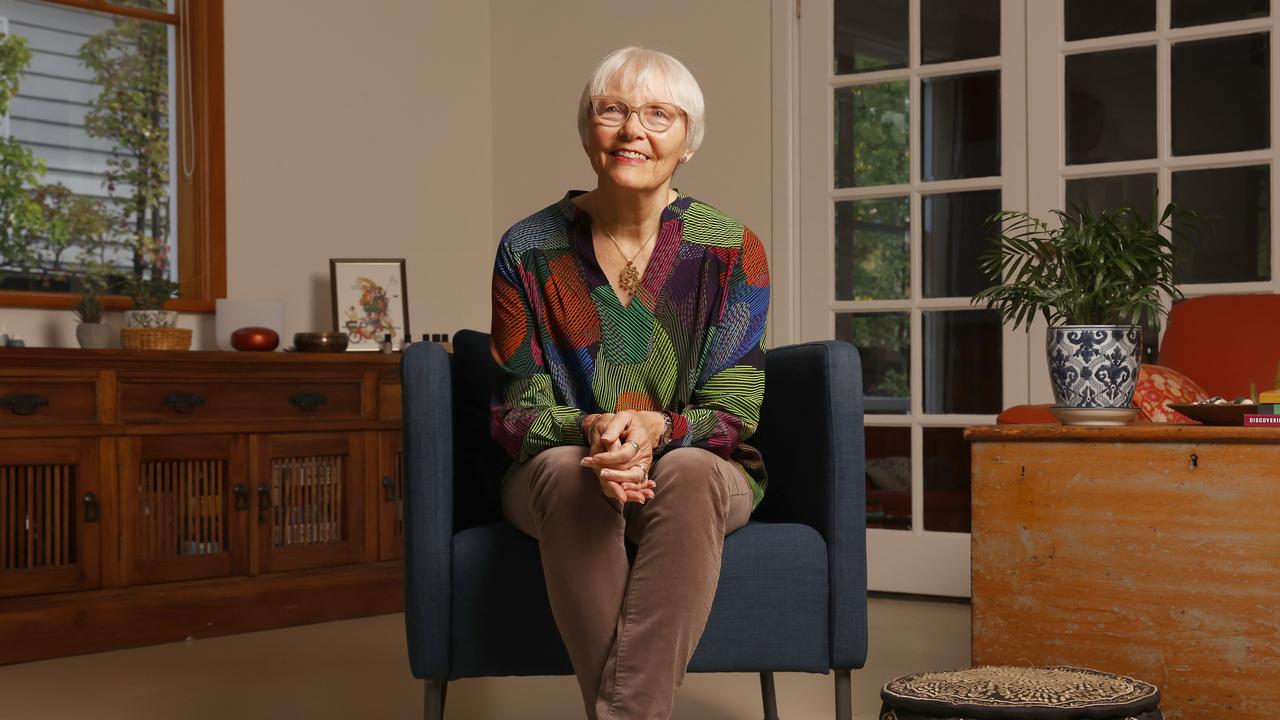TasWeekend: Cherry Ripe
There may be bumper crops, but finding workers to bring in the harvest is a day-to-day challenge for many Tasmanian fruit growers.

Lifestyle
Don't miss out on the headlines from Lifestyle. Followed categories will be added to My News.
BITING into a big, plump Woodstock Orchards kordia cherry for the first time makes your eyes roll back into your head a little. They are that good. These dark-skinned cherries have a reputation for being among the best-tasting in the Huon Valley and this year, for the first time in 15 years, the 1000 kordia trees have a bumper crop, equating to about seven tonnes.
Overseas markets including China are happy to pay $20-$30 per kilogram, depending on fruit size. And that should be good news for farm owner Mike Oakford, 67, who says the branches are so heavily laden with fruit they are brushing the ground.
“We’ve had a very good crop, the heaviest crop we’ve ever had,” Oakford says.
Orchard supervisor John Gurkin, 61, has worked in three other Huon cherry orchards and says the locals agree “Mike grows the best cherries in the valley”.
It might have something to do with the four decades Oakford spent working on fruit research at the Grove Research Station, but it’s obvious he is passionate about his retirement project.
This year, though, growing the cherries has been easier than finding the people to pick them. For the first time, he doesn’t have enough reliable picking staff to harvest them. The potential loss of fruit, here and at other orchards facing the same situation, in the crucial next few weeks is huge.
Woodstock Orchards has had plenty of backpackers dropping by looking for work since the season started just before Christmas, but most of them don’t stay long. Some don’t even last a day.
“It’s been a roller-coaster,” Oakford says. “We’ve had all the lows and highs.”
When TasWeekend dropped in last weekend, it was just over halfway through the month-long picking season and Oakford was numb with disappointment. He looked physically deflated: “The way I feel right now I almost feel like putting a bulldozer through the lot of it.”
In desperation on Tuesday he put a call-out for pickers through Facebook. The next morning, Oakford found himself inducting 15 unemployed, local 20-somethings – 10 of whom came with their own supervisor and ladders.
The team of 10 workers was organised by community employment hub Huon Valley Works, which is funded through Skills Tasmania.
The woman who made it happen, Jenni Bellette, says she heard on the grapevine that Oakford needed staff quickly.

“We’ve got people who need work and he’s a local so we couldn’t let that fruit go to waste,” she says.
Some of the workers are accessing the Federal Government’s Seasonal Work Incentive’s program, which allows unemployed people to earn up to $5000 and still receive their full welfare payments. Two didn’t last the first day.
Fruit Growers Tasmania business development manager Phil Pyke says finding reliable workers can be very challenging for smaller farms.
“Woodstock’s experience is typical of what most of those small to medium cherry growers experience every year and it will only get worse into the future unless we address this problem properly once and for all,” he says.
The Tasmanian cherry industry is worth nearly $200 million annually to the state with an export market of approximately $60 million.
Oakford’s 10,000-tree orchard, set on about 4ha, is planted with lapins, regina and kordia cherries. It’s considered a small operation, but it generates big enough worries for Oakford.
“It’s been a hard year from the point of view that it was dry earlier and then it rained in early December, with 120 millimetres of heavy rain and that damaged about 30 per cent of all the early varieties of lapins, which are our main export variety,” he says.
Last Saturday’s rain, though just 13mm, has meant both the lapins and the special kordia cherries are starting to split.
“Cherries are very delicate,” he says. “Once they start to turn red and ripen, then they can’t stand being wet for more than 24 hours. If they stay wet, they split very easily.
“We had a helicopter here last night to dry them and then this morning I got back and the trees were wet again so there might have been a shower overnight.”
He’s shaking his head and looking at crop wastage this year of about 30 per cent.
Despite that, Oakford’s biggest challenge this year has been finding and retaining staff.
“It’s the worst year we’ve had for staff,” he says. “If we can’t get enough people to pick the fruit quickly enough in the window that we’ve got to do it in, then the fruit gets overripe.”
It’s not easy work. The pickers who have done it before dress in long pants and hoodies and cover themselves in insect repellant. They know the mosquitoes and midges are thick — and so are “the millions of spiders” that drop from the branches.
Pickers are up and down ladders all day wearing harnesses and trying hard not to slip in the mud and squashed cherry mess at their feet. Most admit to aching bodies at the end of the day.
Last Sunday just 13 pickers showed up to work, half the number of pickers Oakford needed.
“I arrived at seven in the morning and I wasn’t even sure if any would show up,” he says.
Some who did come didn’t bother coming back the next day.
Oakford says there are normally backpackers from Asian countries working at the orchard, but this year there are no pickers from Asia; it’s mostly European workers.
Among the workers on our visit are Steven Ros, 26, and his girlfriend Segolene Chazottes, 27, from the south of France. They have been picking Woodstock Orchards’ cherries every day for a month now. It’s the first time they’ve picked cherries, which they say is a lot easier than picking strawberries.

“Strawberry picking is very hard on your back,” Ros says.
They also like picking for a small orchard with friendly and helpful supervisors.
Even though they could get one or two dollars more per lug on other cherry farms, they say they are happy to stay at Woodstock because it’s a nice environment.
They came to Tasmania to see our landscapes and wildlife, particularly the Tasmanian devil, and to taste the cheese but they’ve been too busy picking cherries to do that yet.
Oakford says cherry picking has its challenges.
“Cherries are delicate so it’s not easy work, you’ve got a harness on and when it’s full that weighs 9kg, you’ve got to use ladders, you’ve got to be careful with the picking because you’ve got to keep the stalks in and keep the tree intact without pulling too many buds off, and you are supposed to be sorting the rubbish out,” he says.
But there is decent money to be made for hard workers, he says, with most making at least $200 a day and the faster pickers making more than $300.
He worries the new backpacker tax, which sees them paying 15 per cent for the first $37,000 and then 32.5 per cent on any more earnings, is driving backpackers away.
“As far as the Government’s decision to implement the backpacker tax, I mean I just don’t know whether that’s had any impact at all, but it is coincidental maybe that last year was fine and we operated under the old system and this year it’s not fine under the new system,” he says.
It also appears to be making it easier for the backpackers to pick and choose their jobs because many Tasmanian farms are struggling to find staff this year.
Ros and Chazottes are not impressed with the new backpacker tax. Together they fill 50 9kg lugs a day, which means their combined earnings are $400 a day, but after tax that drops to $340.
“You have a lot of tax for the backpacker,” Ros says.
“For me, it’s a lot of money.”
Oakford is expecting the Government and Tasmanian fruit growers to undertake a review of the backpacker tax and make changes before the season comes around again.
For now, though, he’s just hoping his workforce will show
up tomorrow.
You can buy directly from the Woodstock Orchards gate at 8624 Channel Highway, Woodstock daily during the season, 9am to 5.30pm or order online at woodstockcherries.com.au


